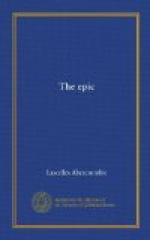The kind of folk-spirit behind the poet is, indeed, different in the Iliad and Beowulf and the Song of Roland from what it is in Milton and Tasso and Virgil. But there is also as much difference here between the members of each class as between the two classes themselves. You cannot read much of Beowulf with Homer in your mind, without becoming conscious that the difference in individual genius is by no means the whole difference. Both poets maintain a similar ideal in life; but they maintain it within conditions altogether unlike. The folk-spirit behind Beowulf is cloudy and tumultuous, finding grandeur in storm and gloom and mere mass—in the misty lack of shape. Behind Homer it is, on the contrary, radiant and, however vehement, always delighting in measure, finding grandeur in brightness and clarity and shining outline. So, again, we may very easily see how Tasso’s poetry implies the Italy of his time, and Milton’s the England of his time. But where Homer and Beowulf together differ from Tasso and Milton is in the way the surrounding folk-spirit contains the poet’s mind. It would be a very idle piece of work, to choose between the potency of Homer’s genius and of Milton’s; but it is clear that the immediate circumstance of the poet’s life presses much more insistently on the Iliad and the Odyssey than on Paradise Lost. It is the difference between the contracted, precise, but vigorous tradition of an heroic age, and the diffused, eclectic, complicated culture of a civilization. And if it may be said that the insistence of racial circumstance in Homer gives him a greater intensity of cordial, human inspiration, it must also be said that the larger, less exacting conditions of Milton’s mental life allow his art to go into greater scope and more subtle complexity of significance. Great epic poetry will always frankly accept the social conditions within which it is composed; but the conditions contract and intensify the conduct of the poem, or allow it to dilate and absorb larger matter, according as the narrow primitive torrents of man’s spirit broaden into the greater but slower volume of civilized life. The change is neither desirable nor undesirable; it is merely inevitable. It means that epic poetry has kept up with the development of human life.




